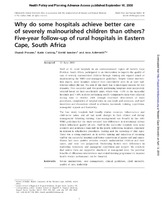Why do some hospitals achieve better care of severely malnourished children than others? Five-year follow-up of rural hospitals in Eastern Cape, South Africa

View/
Date
2008Author
Puoane, Thandi
Katie, Cuming
Sanders, David
Ashworth, Ann
Metadata
Show full item recordAbstract
Staff at 11 rural hospitals in an under-resourced region of Eastern Cape Province, South Africa, participated in an intervention to improve the quality of care of severely malnourished children through training and support aimed at implementing the WHO case-management guidelines. Despite similar intervention inputs, some hospitals reduced their case-fatality rates by at least half, whereas others did not. The aim of this study was to investigate reasons for this disparity. Two successful and two poorly performing hospitals were purposively selected based on their case-fatality rates, which were <10% in the successful hospitals and >30% in those performing poorly. Comparative data were collected during June to October 2004 through structured observations of ward procedures, compilation of hospital data on case-loads and resources, and staff interviews and discussions related to attitudes, teamwork, training, supervision, managerial support and leadership.
The four study hospitals had broadly similar resources, infrastructure and child:nurse ratios, and all had made changes to their clinical and dietary management following training. Case-management was broadly in line with WHO guidelines but the study revealed clear differences in institutional culture which influenced quality of care. Staff in the successful hospitals were more attentive and assiduous than staff in the poorly performing hospitals, especially in relation to rehydration procedures, feeding and the recording of vital signs.
There was a strong emphasis on in-service training and induction of incoming staff in the successful hospitals and better supervision of junior staff and carers. Nurses had more positive attitudes towards malnourished children and their carers, and were less judgmental. Underlying factors were differences in leadership, teamwork, and managerial supervision and support. We conclude that unless there are supportive structures at managerial level, the potential benefits of efficacious interventions and related training programmes to improve health worker performance can be thwarted.
